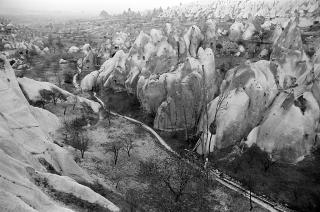Anyone interested in nature or geography should have a look at the spectacular television series “Planet Earth.” I watched a couple of episodes on Antonia’s very large television and was thoroughly impressed by the quality of the videography and the lengths they went to in order to get amazing imagery. I saw the episode featuring Lechuguilla Cave and another on mountains. Without a doubt, it is the best nature documentary series I have seen since The Blue Planet. Both were made by the BBC, and may constitute the strongest endorsement I have seen for that broadcaster.
I have been tempted many times to buy the DVD set of The Blue Planet, but don’t think it would be wise to buy the European version, which will not play on most North American devices. Both The Blue Planet and Planet Earth also have rather good websites. If you are in the UK, you can even download high resolution video clips. Unfortunately, they are only available as Windows-only DRM-protected Windows Media Player clips: hardly what you would want from a public broadcaster. Mac users will have to be satisfied with an excellent new background image.


World’s best vertebrate: tiger
World’s best invertebrate: octopus
More big cat wallpaper from the BBC
Other categories
fuck drm.
Great white shark jump
Tristan,
The whole point of both series is that they are beautiful and amazing. Grainy pirated video hardly serves the same purpose.
I will definitely buy the DVDs eventually, but only once they are available in a format that I will be able to use on most equipment I expect to use in the future (ie. Region 1 DVD players).
Nope, it is a delayed release from the Turkey set. There are a few I set aside to edit further before posting. They have been languishing in a folder on my computer, but it seemed sensible to use a nature-related image to accompany this post.
I am guessing that today’s photo was not taken in Oxford?
The 89 most important images from this site, according to Google.
Does Google Image Search use PageRank as well? If so, you would expect that Tallinn image that got linked so many times to be the top hit.
Here is another cool octopus video. It shows one escaping from a clear box through a 1″ hole.
If you want a properly scary video, see octopus eats shark.
TV is John’s btw, I just take advantage.
Antonia,
Your name was the only point of reference that would have made any sense to regular readers. Also, you were the one who recorded and recommended the shows.
Amazon.ca has the series for $80. I will definitely buy a copy when I return to Canada.
Amazing photo of an Amur Leopard
How Smart Is the Octopus?Bright enough to do the moving-rock trick.
By Carl Zimmer
Aristotle didn’t have a high opinion of the octopus. “The octopus is a stupid creature,” he wrote, “for it will approach a man’s hand if it be lowered in the water.” Twenty-four centuries later, this “stupid” creature is enjoying a much better reputation. YouTube is loaded with evidence of what some might call octopus intelligence. One does an uncanny impression of a flounder. Another mimics coral before darting away from a pushy camera. A third slips its arms around a jar, unscrews it, and dines on the crab inside. Scientific journals publish research papers on octopus learning, octopus personality, octopus memory. Now the octopus has even made it into the pages of the journal Consciousness and Cognition (along with its fellow cephalopods the squid and the cuttlefish). The title: “Cephalopod consciousness: behavioral evidence.”
Losing Sight of Progress
How blind salamanders make nonsense of creationists’ claims.
By Christopher Hitchens
Posted Monday, July 21, 2008, at 11:34 AM ET
It is extremely seldom that one has the opportunity to think a new thought about a familiar subject, let alone an original thought on a contested subject, so when I had a moment of eureka a few nights ago, my very first instinct was to distrust my very first instinct. To phrase it briefly, I was watching the astonishing TV series Planet Earth (which, by the way, contains photography of the natural world of a sort that redefines the art) and had come to the segment that deals with life underground. The subterranean caverns and rivers of our world are one of the last unexplored frontiers, and the sheer extent of the discoveries, in Mexico and Indonesia particularly, is quite enough to stagger the mind. Various creatures were found doing their thing far away from the light, and as they were caught by the camera, I noticed—in particular of the salamanders—that they had typical faces. In other words, they had mouths and muzzles and eyes arranged in the same way as most animals. Except that the eyes were denoted only by little concavities or indentations. Even as I was grasping the implications of this, the fine voice of Sir David Attenborough was telling me how many millions of years it had taken for these denizens of the underworld to lose the eyes they had once possessed.